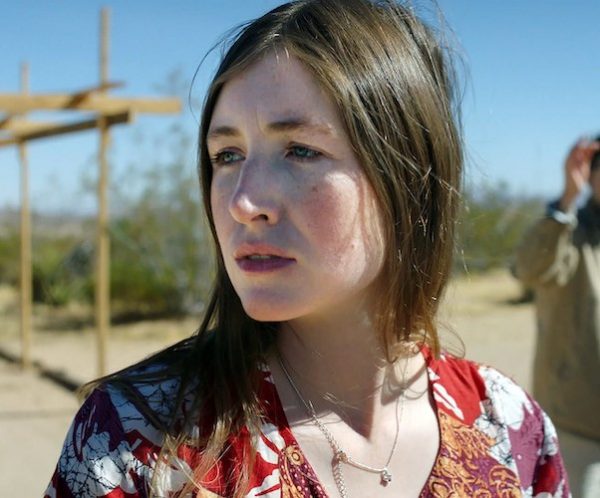Film Review: “She Dies Tomorrow” — Sudden Carpe Diem
By Megan Sergison
She Dies Tomorrow marries the avant-garde with slice of life, jumping from death throes to conversations about dolphin sex over full glasses of red wine.
She Dies Tomorrow, written and directed by Amy Seimetz. Video on Demand

Kate Lyn Sheil in She Dies Tomorrow.
The end is near, and we all know it. We’re afraid of it, or we try not to think about it, but death is there, a blaring red exit sign, shining at the edge of the books we read, the music we listen to, the religions we practice. But death is more than just around the corner in She Dies Tomorrow — it stares at us directly in the face.
The premise here is simple: Amy (Kate Lyn Sheil) knows — not thinks, knows, with a bone-deep certainty — that she’s going to die tomorrow. When she tells her friend Jane (Jane Adams) about her fate, she is initially written off. That is, until Jane goes home, sits down, and the realization hits her that she, too, is going to die tomorrow. The narrative is generated by a sort of contagious hysteria of existentialism that spreads over individuals like a religious awakening, or, well, a virus. “Something’s just terribly wrong and I just have to say it,” Jane confesses, her words unspooling out of her in a panic. Sharing the knowledge of imminent death seems to be compulsive, and soon the ensemble is filled with poor souls staring down the barrel of their finite existence.
Amy Seimetz, as producer, director, and writer, has executed (no pun in intended) her singular vision. She Dies Tomorrow was entirely self-funded, made without any studio support. Seimetz drew on her her pay for the leading role in 2019’s Pet Sematary as the sole source of financing. No surprise that this is an incredibly personal effort, influenced by her father’s death and her struggle to make some sense of it. This is Seimtez’s third directorial venture in a versatile career that’s also included acting, writing, and producing for both film and television.
Seimetz’s ensemble cast, built largely of longtime collaborators, carefully balances the film’s various tones. Adams is at once heartbreaking and snort-inducing, with her flat delivery, completely earnest yet so absurd. Chris Messina and Katie Aselton, as Jane’s brother and sister-in-law, provide surprising tenderness in a scene late in the film that comes closest to suggesting acceptance. The standout here, though, is Kate Lyn Sheil, alluring and subtle and captivating. In a segment early on her face transforms from a mask of utter fear, her mouth contorted in primal whimpering, to a blank canvas of indifference, and back again to fright in a matter of seconds. She evokes the whirl of emotions that come when facing imminent demise; she never veers into melodrama. In fact, the actress gives us an undercurrent in Amy that is almost feral, as if the character is already leaving her humanity behind. In a script that leans heavily on silence and contemplative moments, the quiet nuance of her voice is memorably powerful
Ultimately, She Dies Tomorrow defies definition. The film marries the avant-garde with slice of life, jumping from death throes to conversations about dolphin sex over full glasses of red wine. The adrenaline of a thriller is infused with beats of humor that never feel hollow or insincere. The film explores how we can bear to walk through life with the knowledge that all of this is finite. The end, in this instance, is random and cruel.
Seimetz doesn’t try to make sense of life’s absurdity. Instead, she relies on moods, colors, sounds, and music (Mozart’s Requiem in D Minor makes a recurring appearance) to convey overwhelming dread and awe. We are not given a still and quiet death, a body lying peacefully in a casket. This is dying seen as bloody and nightmarish, awash in the colorful shades of Argento. She Dies Tomorrow capitalizes on the visual impact that only the medium of film can provide: images are primal, words and story line secondary. It’s a sensory overload, and it’s gripping. The movie’s characters, all-too-aware that this is their third act, search instead for something to give their lives meaning — sensation, nature, sex, adrenaline, art, family, or the desire to have a corpse be made into a leather jacket. For Seimetz, that’s all we have before the end comes: the stupid things we say to each other, and the time we spend together.
Megan Sergison is a writer currently based in Somerville, MA. She can be found staring out of the windows of public transportation listening to film scores, persuading anyone and everyone to watch Portrait of a Lady on Fire, or over on Twitter at @megserg.
